Jury Award and Recommendation Award for the Fourth Dream of Red Chambers Award
The judges also proposed China by Jia Pingwa from Shanxi, China; Four Books by Yan Lianke from Henan, China; and The Last Spring in Jiangnan by Ge Fei, from Jiangsu, China as winners of the Jury Award. The Age of Goodbyes by Li Zishu from Malaysia and Lu Yanshi, Criminal by Yan Geling from Shanghai, China, won the Recommended Award.
Jury Award winners for the Fourth Dream of Red Chambers Award (In alphabetical order by title)
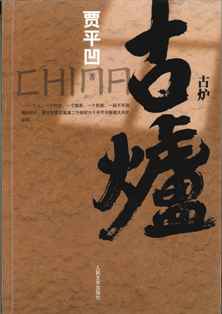 |
China Jia Pingwa Beijing: People’s Literature Publishing (2011) Taiwan: Rye Field Publications, Cite Publishing Ltd. (2011) Introduction The ravaging flames of the “Cultural Revolution” did not begin in the impoverished rural regions; yet how did these flames spread to the grassroots? Jia Pingwa adopted a narrative that built the insignificant daily tidbits into a battlefield at the Gulu Village. The three-tier perspective from characters each representing the wisdom of the weak, the traditional ethics, and the doctrines of Confucianism, Buddhism, Daoism gave the fable of Gulu (a symbol of China) an layer of inspiring meaning. The clarity that come shining through the chaos presents China as a novel that has the potential of surpassing Qin Melody as a modern classic.
Professor Huang Ziping
Chair Professor of Arts Faculty Renmin University of China Author Jia Pingwa was born in 1952 in Feng County of Shaanxi. He now serves at the Xian Branch of the China Federation of Literary and Art Circles. He is a committee member of the China Writers Association, Vice Chairman of the Shaanxi Branches of Chinese Writer’s Association and China Federation of Literary and Art Circles, Chairman of the Xian Branch of the China Federation of Literary and Art Circles, Dean and Ph.D. supervisor of Humanities College at Xian University of Architecture and Technology, Professor of Northwest University, Xi'an Academy of Fine Arts and Shaanxi Normal University. Since his graduation in 1975 from Chinese Department of Northwest University he has been engaged in editorial and literary creation. He was four-time winner of state-wide literary awards, and was awarded respectively The Pegasus Prize for Literature, the Prix Fémina, and Knight of Arts and Literature by cultural and literary associations in France. His works have been translated into more than 20 languages including English, French, German, Russian, Japanese, Korean and Vietnamese. His novel Qin Melody was named winner of the First Dream of Red Chamber Award. |
|
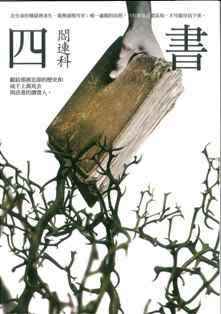 |
Four Books Yan Lianke Hong Kong: Ming Pao Publishing (2010) Taiwan: Rye Field Publications, Cite Publishing Ltd. (2011) Introduction Four Books is a historic epic. The story is set in a labour camp beside the Yellow River during the “Great Leap Forward” from 1958 to 1960. Through telling the story of a 100-person labour camp, Yan Lianke presented an allegory of an era. Snippets and quotes from the Old Testament were liberally used as an inter-text providing a sharp sense of satire. The novel was allegorical in its characterization: all characters are archetypes of a certain personality, a certain type of social individual. The narrator “I”, for example, represents the literati with inherently paradoxical character. The “scholar” represents the conscience and responsibilities of the educated. The “musician” represents beauty and emotions; the “child” represents officials who sacrificed themselves for honour, and is partly a metaphor for Jesus. The novel satirizes the absurdity of the politics and the human condition of that particular era, with the unprecedented use of highly unsettling scenes and imagery. The theme of atonement is given full expression. Four Books is an important work of rich imagination and unique genre that attempts to bring forth the best of Chinese and western cultures.
Professor Chung Ling
Emeritus Professor of HKBU
Author
Yan Lianke was born in Song County of Henan in 1958. He was enlisted in 1978 and graduated at the Department of Political Education at Henan University in 1985. In 2004, he was transferred to Beijing Writers Association as a full time writer from the creative unit of the PLA. He is now the Professor at Remin University. He started writing in 1979 and has published 14 novels; more than a dozen collections of novelettes and short stories; 5 collections of essays and commentary; and also 12 volumes of Anthology of Yan Lianke’s Works. He was awarded the 1st and 2nd Lu Xun Literary Prize, the 3rd Lao She Literary Prize and some 20 other literary awards in China. His Dreams of Ding Zhuang (translated into English) was shortlisted for the Man Asian Literary Prize. His other works were also translated into more than 20 languages including Japanese, Korean, French, German, Italian, Dutch, Spanish, Portuguese, Serbian and Vietnamese and published in over 20 countries and regions. In 2012 he was the writer-in-residence at HKBU. |
|
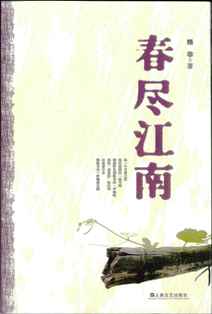 |
The Last Spring in Jiangnan Ge Fei Shanghai: Shanghai Arts & Literature Publishing (2011) Introduction The Last Spring in Jiangnan presents life in contemporary China in fine detail and investigates a diversity of topics including pollution, environmental protection, property speculation, education and couple relationship. It is an inspiring amalgamation of the perils of life and a striking romance. The novel lays bare the unspeakable knots between people and the restless mind in a vivid and fast-paced progression of drama. Its use of metaphor creates a poetic ambiance that integrates seamlessly into the cultural and historic background. The Last Spring in Jiangnan is an example of literature that functions at its best: to convey and perpetuate, to present a record for absurd times. It is a rare and moving novel. Professor Chen I-Chih Member of Final Judging Panel Associate Professor, Department of Chinese Language National Taiwan Normal University Author Ge Fei was born in Dantu of Jiangsu in 1964. He graduated from the East China Normal University where he also served a teaching stint; in 2000 he completed his Ph. D. in Arts and transferred to Tsing Hwa University to teach at the Department of Chinese. Since his debuting novel Lost Ark in 1987 he has published a number of novels including Enemy, Edge, The Flag of Desire, The Face of Plum Blossom, Mountains and Rivers into Dreams; and a number of collections of novelettes and short stories. He also has in publication a number of collections of essays and commentary. He was awarded in 2004 the Achievement Award in Chinese Media; the 1st Prize of 2004 List of Best Novels; The 2nd 21st Century Ding Jun Literary Prize, and others. His works have been translated and published in English, French, Japanese and Italian versions. |
Recommended Award winners for the Fourth Dream of Red Chambers Award
(In alphabetical order by title)
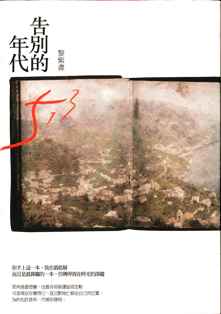 |
The Age of Goodbyes Li Zishu Taiwan: Linking Books (2010) Introduction Li Zishu, who has been turning out quality works for more than a decade, is considered one of the best writers for the Chinese short story genre. If one were to say that her shorts in The Plague in the Mountains and The Door of Heaven are an array of delicate dimsum, The Age of Goodbyes is a literary feast. Imaginary characters sharing the same name run through different stories, eras, narratives and books in search of memories and secrets forgotten by time. The tri-layer narrative created a maze out of words; the fate of the characters was at once remote and intimate. The reader falls into a blind alley full of transsexuals, hookers and fallen angels at one time, and at another time into the grasp of the dark humour and outlandish imagination of the author. The Age of Goodbyes opens up a new vista for the Chinese novel genre and is a one-of-a-kind work that deserves fine appreciation. Professor Michael Berry Member of Final Judging Panel University of California, Santa Barbara Author Li Zishu was born and grew up in Ipoh, Malaysia and now lives in England. Li received the First Prize in Malaysian Chinese Fiction of Huazhong Literary Award in Malaysia (1995, 1997, 1999), First Prize in Prose of Huazhong Literary Award (1997), Recommended Fiction Prize of Huazhong Literary Award (1997, 1999, 2001, 2003), Excellent Prose Award of Huazhong Literary Award (2001) and First Prize in World's Chinese Fiction of Huazhong Literary Award (2001). Other awards received include: First Prize in Short Stories of Taiwan Unitas Award (1996, 2000), Times Literary Prize Jury Award in Short Stories (2005). Her writings include a collection of short stories The Door of Heaven and The Plague in the Mountains; collection of micro-fiction Acronym, Book of Fortune, Micro Li Zishu; essay Because Time is disorderly; collection of essay Stand Up; as well as editorial capacity of the Huazong Literary Prize retrospective: Sea of Flowers. |
|
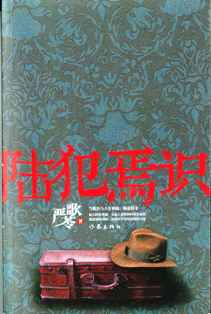 |
Criminal Yan Geling Beijing: Writers Publishing (2011) Introduction Yan Geling’s novel Criminal is a major contribution to contemporary literature. The work overlaps a love story upon a heavy historic theme. The protagonist Lu Yanshi is a typical educated liberalist who received European-American education and yet upheld traditional ethical values. An individualist, subjected to all manners of incredible experiences, finally understood the meaning of freedom and love. The story took on directly all the wars and political movements in the 20th century China, and emphasized that the beauty of life is the true nature of the world. The story outlines themes of melancholic love and waiting, an image of a benevolent woman who suffered in earthly silence all manners of pain and humiliation. Such has always been the philosophy and creative motif of Yan Geling. The unique background of the novel serves to bring out in greater contrast the moving power of humanity. Professor Chen Sihe Chairman of the Final Judging Panel Fudan University Author Yan Geling was born in 1958 in Shanghai. She joined the Chinese Writers Association in 1986 and began publishing at the age of 20. In 1990 she was awarded a scholarship to study a Master in Creative Writing at The School of the Arts at Columbia University of Chicago. Many of her works including Xiao Yu The Young Lady, Heavenly Bath and White Snake have been adapted to movies successively. She was awarded the Short Fiction Award by the United Daily, China Times and Central Daily Literary Prize, and her novels were awarded the Jury Award of The United Daily Novel Prize and the Jury Award of the China Times Literary Prize. Her works include Xiao Yu The Young Lady, No Exit Café, The Other side of the Ocean and The Ninth Widow. |



